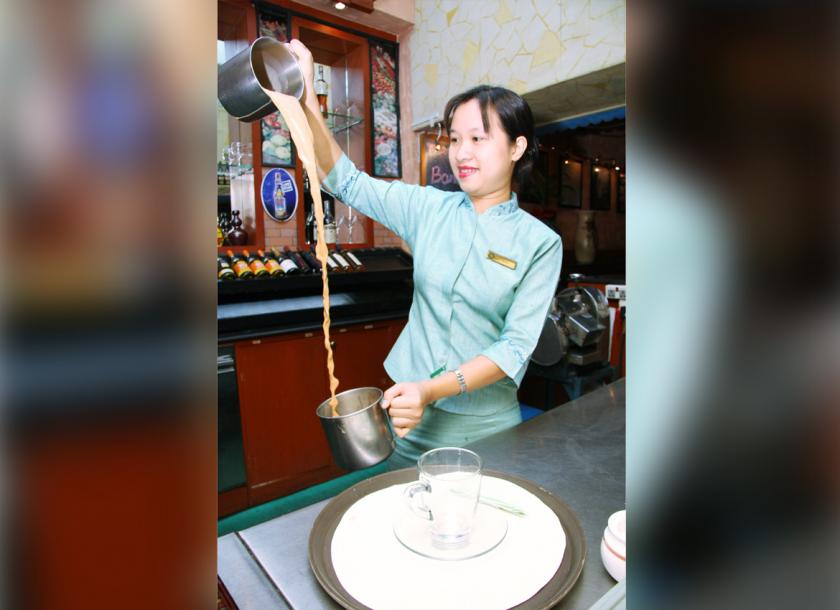Myanmar: Coffee and tea connect daily life of the locals
Millions, if not billions, of people around the world start their days with a hot, stimulating beverage like coffee or tea. Coffee is one of the most popular drinks but in Myanmar tea is a drink that is deeply connected to the daily life of the locals.
For those who are unable to go to tea shops regularly, there are brands of instant coffee and instant tea in the market today and every home has it to satisfy their craving. However, taste of the instant tea is far more inferior to the traditional step-by-step brewed tea.
Since ancient times tea culture has been deep rooted in Myanmar society, where having tea together show affection among one another.
If one looks back into the tea culture it can be said that it began after King Thibaw was exiled to India in 1885.
Historical facts reveal that the first tea shops in the country were created by Indians. So it would not be wrong to say that drinking tea and coffee was brought into Myanmar by the British and this culture blossomed since the days of the colonial rule.
According to medical reports roasted coffee beans, ground, and finally brewed which becomes coffee is good for the health. There are conflicting reports which says that some countries in Asia and Europe where adding milk and sugar to pure black coffee can be harmful while some say that it could be beneficial.
So why most people go to tea shops and pay K 300 to 600 just for a cup? It is because of its taste and for this taste the main ingredient itself is the tea leaf. So how is this tea leaf produced?
“Tea leaves plucked from tea plantations that grow on hill slopes have a better flavor. There are three varieties of tea leaves – Shwepe, Khar Kant and Hnin Tat. Every harvest of tea varies from year to year due to changes in climate, rainfall, and other seasonal conditions. We use drying system when they are in the plucking stage before they lose their moisture and produce pickled tea leave (sweet). Tea leaves processed for making tea can be used within two years or much longer depending how it is preserved,” says U Pyae Nyein, Business Manager of the Nagar Pyan Tea Enterprise.
Since 2013, many high grade tea shops have emerged either in neighbourhood alleys or on busy streets and roads and they serve tea, instant coffee; traditional food, snacks, Chinese and Indian food. So it is convenient for a family with different tastes to enjoy their breakfast at the same place.
Previously going to tea shops was traditionally male-dominated. But now it has become a meeting place for people of different ages. It’s no more a place just to have a cup of tea but instead to meet each other and chat, exchange news and share their daily experiences. So tea shops remain as centres of social interaction and have become more important than homes or offices.
Although high grade tea shops offer a variety of foods and snacks they still lack in having experienced tea masters.
Every customer has his or her own particular taste like Cho Saint, Kya Saint, Pawt Kya, Cho Pawt, Pawt Saint, Kyauk Padaung, Pone Nar and Ma Kho. But now most of the tea shops just brew the tea and the tea master just adds condensed milk or evaporated milk to the brewed tea according to the customer’s liking and it’s served. So although orders may be of different varieties, the taste remains the same.
“Previously tea masters were most important persons in tea shops. Just by ordering tea to their favourite tastes customers were able to just his ability. But now although you order you preference taste, the tea is already brewed and only added with condensed milk. So tea lovers have to consume sub-standard tea,” says Ko Than Htaw from Hlaing Township in Yangon.
“Nowadays, most of the tea shops don’t have enough workers, so they have to prepare brewed tea instead of the traditional step-by-step method. In the long run drinking this readymade brewed tea will be harmful for the health,” says a Branch Manager of Nagar Pyan tea enterprise in Mingalar Taungnyunt Township.
Then most women think that astringent taste from tea may damage their health and prefer drinking coffee rather than tea and for that reason, customers have turned to brewed coffee or instant coffee.
“Many foreigners like Myanmar coffee powder and is quite popular in the market. Instant coffee is easy to make but many companies and coffee lovers still prefer pure coffee power so we grind the coffee beans and sell the power on the spot,” said the owner of “Su” coffee powder shop.
The main content in coffee is Trimethylxanthine also known as caffeine and its content is 1 to 2 percents in the coffee bean. Other contents are hydroxycitric acid, chromium and bitter orange that can increase body metabolism up to 30 percent. According to medical experts, Alzheimer’s disease, Parkinson’s disease, Dementia, Heart disease, diabetes mellitus type 2, liver cirrhosis and Gout can be reduced just by drinking coffee.
“I opened this café because I enjoy spending time at cafés. I displayed paintings and woodcarvings in it just for customers to be able to enjoy the taste of coffee and food while viewing them. I mostly sell Switz-brand coffee. This café was opened recently so foreigners still do not know much about this café, but youths from Pyin Oo Lwin and Mandalay come here and hang out,” said a responsible person from Htan Yeik Nyo Café in Pyin Oo Lwin.
Source: https://www.mmtimes.com/news/coffee-and-tea-connect-daily-life-locals.html


 Thailand
Thailand




